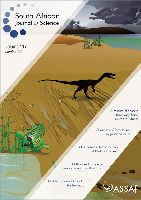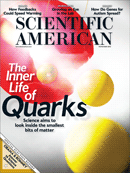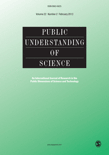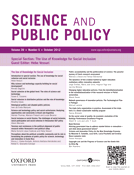
SOUTH AFRICAN JOURNAL OF SCIENCE
Scope & Guideline
Championing Open Access for All Scientists
Introduction
Aims and Scopes
- Interdisciplinary Research:
The journal emphasizes research that spans multiple disciplines, reflecting the interconnected nature of scientific inquiry and societal challenges. - Local Contextualization of Global Issues:
Papers often explore global challenges, such as climate change and public health, through the lens of South African realities, ensuring relevance to local conditions. - Sustainability and Environmental Science:
A consistent focus on environmental issues, particularly those impacting South Africa, including biodiversity loss, climate resilience, and sustainable resource management. - Health and Societal Well-being:
Research addressing public health challenges, healthcare delivery, and the socio-economic factors affecting health outcomes among South African populations. - Policy and Governance:
Exploration of the implications of scientific research on policy-making and governance, particularly in areas like water management, energy, and public health. - Community Engagement and Indigenous Knowledge:
A unique contribution of the journal is its emphasis on integrating indigenous knowledge systems and community perspectives into scientific research.
Trending and Emerging
- Climate Change and Adaptation Strategies:
There is an increasing emphasis on research related to climate change, particularly studies focusing on adaptation strategies for communities and ecosystems in South Africa. - Public Health and Pandemic Preparedness:
The COVID-19 pandemic has spurred a significant rise in research addressing public health issues, healthcare delivery systems, and preparedness for future health crises. - Data Science and Technology in Research:
Emerging themes include the utilization of big data, artificial intelligence, and digital tools to enhance research methodologies and address complex societal issues. - Social Justice and Equity in Science:
A growing number of publications focus on the intersection of science, social justice, and equity, emphasizing the role of science in addressing disparities in health, education, and resource access. - Biodiversity and Conservation Efforts:
There is a renewed focus on biodiversity conservation, reflecting global concerns about species extinction and ecosystem degradation, with special attention to South Africa's unique biomes.
Declining or Waning
- Traditional Ecological Studies:
Papers focused solely on traditional ecological studies without integrating socio-economic or political contexts are becoming less prevalent, as there is a growing recognition of the need for interdisciplinary approaches. - Purely Theoretical Research:
The journal has seen a decline in submissions that are purely theoretical without practical applications or implications for South African society, as there is an increasing demand for research with direct societal impact. - Historical Perspectives on Science:
Research papers that primarily focus on historical analyses of scientific developments in South Africa are becoming less common, with a shift towards contemporary issues and future-oriented research.
Similar Journals

CENTAURUS
Fostering Intellectual Engagement in the History of ScienceCENTAURUS is a prestigious journal dedicated to the History and Philosophy of Science, published by BREPOLS PUBL in the United States. With a storied history dating back to its inception in 1950, CENTAURUS has consistently provided a platform for critical engagement and scholarly discourse in the realm of scientific development and its philosophical implications. Recognized for its academic rigor, the journal holds a commendable Q2 ranking in the History and Philosophy of Science category for 2023, reflecting its substantial contribution to the field, as evidenced by its ranking in the top 11% of 223 journals in Scopus. Although it operates on a subscription-based model, the journal is a vital resource for researchers, professionals, and students seeking insightful analyses and discussions on the interplay between science and its philosophical dimensions. Published from Turnhout, Belgium, CENTAURUS continues to shape the landscape of scientific thought with its well-curated articles that examine over a decade's worth of scholarly contributions.

SCIENTIFIC AMERICAN
Connecting Research with Public CuriositySCIENTIFIC AMERICAN, published by Springer, stands as a prestigious multidisciplinary journal dedicated to disseminating cutting-edge scientific knowledge across a range of fields. Established in 1947, this journal has been integral in bridging the gap between scientific research and public understanding, making complex ideas accessible to a broader audience. With an ISSN of 0036-8733 and E-ISSN of 1946-7087, it maintains a strong standing within the academic community, currently ranked in the Q3 category for its multidisciplinarity, and is positioned at #93 out of 120 in its Scopus ranking, reflecting its valuable contribution to scientific discourse. While the journal is not open access, its long history and commitment to knowledge sharing ensure it remains a vital resource for researchers, professionals, and students alike, fostering a deeper appreciation of science in society.

JOURNAL OF THE INDIAN INSTITUTE OF SCIENCE
Fostering interdisciplinary innovation and discovery.JOURNAL OF THE INDIAN INSTITUTE OF SCIENCE, published by Springer, is a prestigious multidisciplinary journal with a strong foundation in advancing scientific knowledge since its inception in 1974. With a notable Q2 ranking in its category as per the 2023 metrics and an impressive Scopus ranking within the top 20% of its field, it serves as a vital platform for researchers, students, and professionals to disseminate and access groundbreaking studies and innovative ideas. The journal covers a wide range of disciplines, catering to diverse interests and fostering interdisciplinary collaboration among scholars. As a testament to its impact within the scientific community, the journal continues to contribute significantly to the global landscape of research and knowledge sharing. While it currently does not offer an open-access model, its traditional publication format ensures rigorous peer review and high-quality content that remains a trusted resource for those in academia and industry alike. The journal is headquartered in New York City, ensuring a global outreach to its readership.

PUBLIC UNDERSTANDING OF SCIENCE
Transforming Scientific Discourse for AllPUBLIC UNDERSTANDING OF SCIENCE, published by SAGE PUBLICATIONS LTD, stands as a crucial multidisciplinary journal dedicated to exploring the intricate relationship between science and society. With its well-established history from 1992 through to 2024, this journal offers an essential platform for researchers, professionals, and students interested in the communication of scientific knowledge and its impact on public perception. Recognized for its high academic standards, it proudly holds a Q1 ranking in the categories of Arts and Humanities, Communication, and Developmental and Educational Psychology, signifying its significant influence and contribution to these fields. The journal’s impressive percentile rankings further underscore its vital role in advancing scholarship, interaction, and understanding in the public discourse of science. Although it does not currently offer open access options, the journal is committed to disseminating scholarly research that informs and enriches the dialogue on critical scientific issues, making it a pivotal resource for anyone engaged in or studying the dynamics of science communication.

Spontaneous Generations-Journal for the History and Philosophy of Science
Connecting Generations of Thought in Science and PhilosophySpontaneous Generations: Journal for the History and Philosophy of Science is a dedicated publication focusing on the rich fields of history and philosophy within the scientific domain. Published by the Institute for the History and Philosophy of Science and Technology, this journal provides a vital platform for scholars, researchers, and students to explore and disseminate ideas that bridge the historical context and philosophical inquiries of scientific practices. With its commitment to open access, Spontaneous Generations ensures that groundbreaking research is widely available, fostering an environment of collaboration and knowledge sharing. Aiming to engage a diverse audience, this journal is pivotal for those looking to understand the evolution of scientific thought and its implications on contemporary issues, making it an essential resource in the academic community.

Desenvolvimento e Meio Ambiente
Connecting disciplines to tackle environmental challenges.Desenvolvimento e Meio Ambiente is a pioneering open-access journal published by Universidade Federal do Paraná, Editora, committed to advancing knowledge in the fields of Environmental Science and Geography. Established in 2000, this Brazilian journal serves as a vital platform for researchers, professionals, and students to share interdisciplinary studies that address the pressing environmental challenges faced in both local and global contexts. With an E-ISSN of 2176-9109, this journal is particularly significant given its current quartile rankings of Q4 in Environmental Science (miscellaneous) and Geography, Planning, and Development in 2023. Although it has a modest impact factor reflected by its Scopus ranks—691/821 and 206/233 within their respective categories—the journal is dedicated to elevating the discourse surrounding sustainable development practices. With a convergence period extending from 2018 to 2024, Desenvolvimento e Meio Ambiente is an essential resource for anyone invested in the intersection of environmental studies and social sciences, fostering a community of inquiry and collaboration amidst Brazil's unique ecological landscape.

Indian Journal of Traditional Knowledge
Exploring the Depths of India's Rich Knowledge HeritageThe Indian Journal of Traditional Knowledge, published by the NATL INST SCIENCE COMMUNICATION-NISCAIR, serves as a pivotal platform for scholarship in the fields of traditional knowledge, complementary and alternative medicine, and manual therapy. With an ISSN of 0972-5938 and an E-ISSN of 0975-1068, this esteemed journal has embraced open access since 2002, ensuring that research is widely available to practitioners and scholars alike. Based in New Delhi, India, and with a commendable Q2 ranking in both the Complementary and Alternative Medicine and Complementary and Manual Therapy categories as of 2023, this journal aims to bridge the gap between traditional practices and modern scientific inquiry. By publishing innovative research and review articles, it not only highlights the rich cultural heritage and knowledge systems of India but also contributes to the global discourse surrounding holistic health and wellness. Researchers, professionals, and students will find invaluable insights and significant advancements within its pages, making the Indian Journal of Traditional Knowledge an essential resource for anyone interested in the dynamic interplay between tradition and contemporary medical practice.

Science and Public Policy
Empowering Policymakers with Scientific EvidenceScience and Public Policy, published by Oxford University Press, serves as a vital conduit for research at the intersection of scientific inquiry and public governance. With its ISSN 0302-3427 and E-ISSN 1471-5430, this esteemed journal has steadily built a reputation for excellence within multiple fields, identified in 2023's quartile rankings as Q1 in Geography, Planning and Development, Q2 in Management, Monitoring, Policy and Law, and Q1 in Public Administration. The journal’s scope includes in-depth analysis and discussions on how scientific knowledge influences public policy decisions, essential for researchers, professionals, and students alike. Spanning decades since its inception in 1974, Science and Public Policy is committed to providing a platform for scholarly work that addresses contemporary issues affecting policy frameworks, making it a crucial resource for those invested in the relationship between science and society. With a consistent track record of high impact, evident in its Scopus rankings that place it in the 75th percentile for Geography and Planning, and 70th for Public Administration, the journal promises to be an indispensable part of your library.

JOURNAL OF SCIENTIFIC & INDUSTRIAL RESEARCH
Exploring Frontiers of Knowledge in Science and IndustryJOURNAL OF SCIENTIFIC & INDUSTRIAL RESEARCH, published by the NATL INST SCIENCE COMMUNICATION-NISCAIR in India, serves as a prominent multidisciplinary platform for disseminating impactful research since its establishment in 1969. With an Open Access model adopted in 1999, the journal ensures wide visibility and accessibility of innovative findings across various scientific disciplines. The journal, indexed with an ISSN of 0022-4456 and an E-ISSN of 0975-1084, offers researchers, professionals, and students an opportunity to engage with a diverse body of work, ranking in Q3 of the Scopus categories for 2023. Its scope spans an extensive timeline, accommodating submissions across a wide array of industrial and scientific advancements, promoting collaboration and knowledge sharing. By adhering to rigorous academic standards, the JOURNAL OF SCIENTIFIC & INDUSTRIAL RESEARCH plays a critical role in shaping the future of science and industry, drawing contributors and readers eager to contribute to and understand the latest trends and discoveries in this dynamic field.

Metode Science Studies Journal
Exploring the Intersections of Knowledge and InquiryMetode Science Studies Journal, published by UNIV VALENCIA, BOTANICAL GARDEN UV, is an esteemed open-access journal dedicated to advancing scholarly discourse in the fields of history and philosophy of science and multidisciplinary studies. Since its inception in 2013, the journal has positioned itself as a vital resource for researchers, professionals, and students, fostering an environment for innovative research and cross-disciplinary dialogue. Based in the vibrant city of Valencia, Spain, this journal aims to publish high-quality articles that explore the intricate relationships between scientific practices and philosophical inquiries. With a current impact factor demonstrating its relevance in the academic community, the journal is indexed in Scopus, ranking in the 52nd percentile for history and philosophy of science and the 33rd percentile for multidisciplinary studies. Scholars can access a breadth of research outputs that span from 2015 to 2024, thereby contributing significantly to the intellectual landscape of the respective fields.